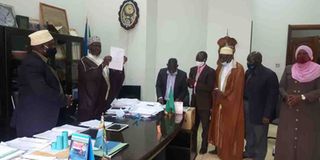Proposed amendments hand Mufti Mubajje five-year lease

Mufti Shaban Mubajje (second left) receives a document containing proposed amendments to the UMSC constitution from a committee chaired by the former UMSC secretary, Dr Edris Kasenene, on August 21. PHOTO/ courtesy
What you need to know:
The current UMSC constitution gives exclusive powers to the Mufti to perform both spiritual and managerial roles.
Sheik Shaban Ramadhan Mubajje could be in line to occupy the office of Grand Mufti of Uganda for another five-year term if a draft amendment of the Uganda Muslims Supreme Council (UMSC) constitution is ratified.
Under the current UMSC constitution, Sheik Mubajje, who has been in office since December 2000, is supposed to relinquish office when he clocks 70 years in 2025. A draft new constitution, which Daily Monitor has seen, indicates that the mufti should be aged at least 55 and can serve one term of 10 years until he clocks 75.
This implies that Mufti Mubajje, 66, is eligible to contest in the forthcoming Muslim elections whose date is yet to be announced.
The new amendments also legitimise two deputies, up from one that the current 1987 constitution recognises. Already, Sheik Mubajje appointed Sheik Abdul Ssemamba and Sheik Ali Waiswa as his deputies.
The 230-member general assembly, which is the top decision-making organ of UMSC, and is also responsible for electing the Mufti, stands to have its wings clipped. There is a proposal to have the Mufti elected by 21 members of Majlis Al-Ulama (college of learned sheiks) “from the entire Sunni male Muslim population of Uganda.”
Although amendments to the UMSC constitution are supposed to be initiated by the general assembly, this time round, the work was done by a six-member team led by former UMSC secretary, Dr Edris Kasenene. Other members on the constitutional review team are former UMSC secretary general Zaid Kavuma, Hajj Sulaiman Musana, Omar Muhammad Wasswa, Hajjat Ladhiya Namakula Lukwiya,, and Hajj Wahab Rugasa.
Under the current constitution, the Mufti only chairs the management committee and the Majlis Al-Ulama. There is a proposal to allow him to chair the executive committee, which makes standing orders that govern the proceedings of the assembly and other organs of UMSC.
“The executive committee shall from time to time determine a proportion of funds collected from the Muslims to be retained by or forwarded to Juma mosques committees, county councils, regional councils and district councils,” the 61-page draft constitution reads in part.
It also adds: “The executive committee shall be the principal organ of governing, conducting and administering the affairs of the council and shall have full powers to act on behalf of the assembly...”
This is a sharp contrast from what Prof Tarsis Kabwegyere recommend in the government-backed commission of inquiry to resolve warring factions and power struggles that dogged the Muslim community for decades. One of the recommendations was to dissolve the current parallel administrations and allow Muslims elect a new unifying Mufti using a new constitution which was drafted by the committee.
The current UMSC constitution gives exclusive powers to the Mufti to perform both spiritual and managerial roles. The Prof Kabwegyere-led committee, however, suggested that the Mufti only concentrates on spiritual work.
Sheik Mubajje did not take long to express his dissatisfaction when Prof Kabwegyere released his report in June 2014. The Mufti held back then that UMSC had a laid down procedure of electing leaders to which it would stick.
The proposed amendments also create a UMSC tribunal to settle internal disputes and a property trust to manage property as recommended by Prof Kabwebyere.
While receiving the proposed amendments on August 21, Mufti Mubajje hailed the efforts of Dr Kasenene’s committee. He also emphasised that the next Muslim general elections will be conducted when the amendment process runs its course.
“I have been at the helm of council leadership for the last 20 years. We have really faced a lot of challenges and noted new trends within the Muslim community that need to be reflected in our constitution for steady progress,” he said.
.Hajj Nsereko Mutumba, a former spokesperson of UMSC, said: “It is not within the mandate of the Kasenene committee to suggest amendments, the constitution stipulates clearly how it can be changed. It is the work of the General Assembly to initiate such a process, but not management as it has been done.”
Mufti Mubajje, a former district Kadhi for Mbale, assumed office on December 3, 2000. His tenure has been characterised with leadership wrangles. Efforts have been made in the past by President Museveni and Muslim MPs to mend fences, but with little tangible gains.
Rules
Qualifications of Mufti in current constitution
• Must be a Ugandan Sunni male Muslim
• At least 40 years old
• Having a degree or its equivalent in Sharia from a recognised Islamic University
• Fluency in Arabic language
• Following footstep of Prophet Muhammad
• Free from offences under the National and Islamic laws
• Remains in office until he is 70 years old
Qualifications of Mufti in draft constitution
• A Ugandan Sunni male Muslim
• At least 55 years of age and not exceeding 75 years old
• At least a holder of a Bachelor’s Degree in Sharia or its equivalent from a recognised Islamic University
• Fluent in both Arabic and English
• Following the footsteps of Prophet Muhammad
• Respectable, properly married and a good practicing Muslim
• With a clean track record free from offences.
• 10 years of working experience in a Muslim leadership position
• Remains in office for one term of ten years



